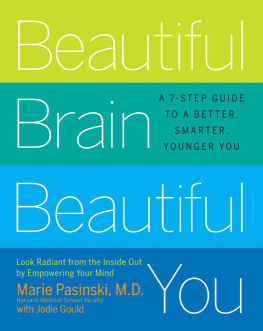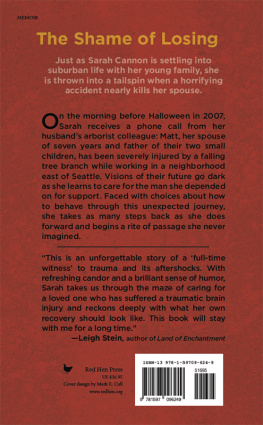Her Beautiful Brain

Copyright 2014 by Ann Hedreen
All rights reserved. No part of this publication may be reproduced, distributed, or transmitted in any form or by any means, including photocopying, recording, digital scanning, or other electronic or mechanical methods, without the prior written permission of the publisher, except in the case of brief quotations embodied in critical reviews and certain other noncommercial uses permitted by copyright law. For permission requests, please address She Writes Press.
Published 2014
Printed in the United States of America
ISBN: 978-1-938314-92-6
e-ISBN: 978-1-938314-93-3
Library of Congress Control Number: 2014934292
For information, address:
She Writes Press
1563 Solano Ave #546
Berkeley, CA 94707
There are as many versions of every familys history as there are family members. This is mine. Some names of people and places have been changed.
I WANT TO BE STRONG
Words and music by Glenn Close and Kathe Jennifer Green
Published by Sobel Global Music o/b/o Up With People
All rights reserved. Used by permission
IN THE MIDDLE OF IT ALL
Words and music by Arthur Alexander
1962 (Renewed 1990) TEMI COMBINE, INC.
All rights controlled by COMBINE MUSIC CORP. and administered by EMI BLACKWOOD MUSIC INC.
All rights reserved. International copyright secured. Used by permission
Reprinted by permission of Hal Leonard Corporation
To my husband, Rustin
And my mother, Arlene
CONTENTS
Prologue: Typing Class
I had a new nightmare: I was suffocating in the giant breasts of Miss Weis, as she surrounded me and contorted my fingers into unnatural positions andfrom just next to my earyelled her commands to the class. Ready, go! The quick brown fox jumps over the lazy dog. Faster! The quick brown fox jumps over the lazy dog. Faster! The quick brown fox
Louder and louder she shouted, as I struggled for breath, trapped inside her titanic bosom. Gone were the old dreams of giant spiders under my bed or my braces being tightened by a plumbers wrench. Miss Weis now reigned supreme over my nights, screaming about the quick brown fox and the lazy dog, predicting my doomed future: unable to get a good secretarial job, I would wander the earth in search of work as a waitress, a maid, a janitor.
It was 1969. I was twelve years old. Fall semester, eighth grade, Nathan Eckstein Junior High School, Seattle, Washington. I had no future because I could not type.
Ah, Miss Weis! You saw my clumsy fingers and you feared for me. You sized up my pointy tortoise-shell glasses and my mouth full of braces and yes, you feared for me. You knew that girls like me had to learn to type. You knew that all that noise about times allegedly a-changin was just that, noise, and that your mission was to form the fingers of vulnerable girls, to train their hands, before their heads got all filled up with all this new noise about college and careers and, God forbid, Womens Lib.
Ah, Miss Weis. You gave me my first C. Maybe you grieved for me a little as you noted it in your ledger. But then you moved on to the next semester: six more class periods, thirty students per period. A few boys, but you ignored them, those lazy dogs, because you knew they didnt need you. The girls needed you.
And I moved on too, like a quick brown fox, running as fast as I could from the future as envisioned by Miss Weis.
And the times, they did change. Fancy east coast colleges decided they wanted geographic diversity and public school kids, and Wellesley College gave me a scholarship.
And typewriters changed too. Correct-tape was invented, thank the Lord. Electric typewriters were now affordable, and Mom gave me a little blue Royal as a high school graduation present. And, just as Miss Weis had predicted, typing kept my body and soul together. I typed all of one summer at my grandfathers insurance company, convinced I was going crazy. But by the end of that summer I was able to type faster than I could think. At college, I typed other girls papers for cash. After college, my first job title was secretary at a Boston publishing company, where I was given charge of my very own Queen of All Typewriters, the IBM Selectric. Miss Weis would have been astounded by the speeds I reached: sixty, seventy, 100 words per minute. Fingers flying, hands properly arched, off I went, typing my way into adulthood.
Just as my mom had, a quarter century earlier. Divorced, with two small children and one year at the University of Montana, it was her typing and her math skills that got her in the door at a life insurance company.
When I was twenty-one and in that first job, smarting a little every time I saw the word secretary next to my freshly graduated name, there was a part of me that felt defeated by the world, by the fact that I was doing exactly what my mother had done to stay alive, back in the dark ages of the early fifties. There was a part of me that felt ashamed for having taken the Little, Brown personnel director at her word when she explained that all of our young women start as secretaries, while our young men start as sales reps. It was 1978. I should have stormed out of the office. Many of my Wellesley classmates would have. But I was paying my own rent, and I was being offered a job in publishing, and I took it. And though it wasnt right or fair that it was the ONLY start offered me by personnel director Cindy Cool, it was a start.
A start I never would have gotten without Miss Weis and her metronome and her quick brown fox.
Fast-forward thirty-plus years, and my husband and I are walking around a little building in south Seattle called the Telephone Museum. We are there because were making a documentary film about Alzheimers disease, which has been hard at work destroying my moms brain for at least a decade. Were looking for visual metaphors and they are everywhere: colorful tangles of cables, rows of big black switches with labels like Data and Memory. Then we see an old Teletype machine. We both spent most of the 1980s in newsrooms, so a Teletype evokes a visceral reaction for us, a cascade of all the events we first saw in staccato type beating down on rolls of newsprint: John Lennon murdered. Challenger exploded. Grenada invaded.
Could you turn it on? we ask.
Sure, our guide, a retired phone company lifer, responds. The machine, which is the size of a snowmobile, hums to life. Then he presses the red Test button and the beautiful clacking begins, and we see the test sentence: The quick brown fox jumps over the lazy dog. Carriage return, repeat. The quick brown fox jumps over the lazy dog. Return, repeat. Over and over again, in twelve-point Courier type. We are hypnotized.
Could you make it screw up? my husband asks.
We watch as our guide hits repeat before the full test line is typed. The keys falter and jam. He does it again and then again. Soon, theres a pileup of a dozen keys and a black blot of text on newsprint.
Quick Brown Fox becomes the title of our film.
It wasnt obvious enough, we were told. It will hurt sales. And maybe it did. But we stuck by it. The sight of the keys jamming on an old Teletype said everything we needed to say in one image about Alzheimers disease.
And it said more. For all the generations of women who typed to feed their children, to get through college, to survive, the words Quick Brown Fox said struggle and survival. They said that this life does not deserve to end in the jammed keys and black ink of Alzheimers disease.
Computers have put the secretaries and the Miss Weises of the world out of a job. Now, executives bend their groomed fingers around smart phones and our children type faster than we do.
Next page









